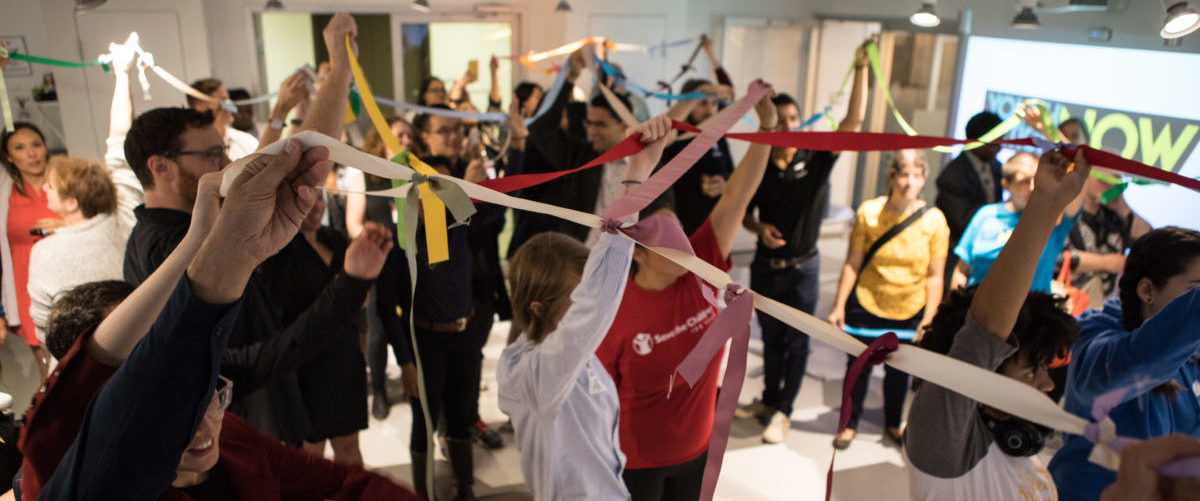
SDG Deep Dives
In the fall of 2019, Impact Hub Ottawa and Community Knowledge Exchange, in partnership with Living Tapestries, brought together leaders and change-makers in Ottawa for a series of workshops exploring the role of collaboration in advancing outcomes related to the Sustainable Development Goals (SDGs).
This is the first in a series of two posts that shares reflections and lessons learned from this project, which was made possible by the generous support of the Ottawa Community Foundation.
Getting Collaboration to Work for You and Your Organization
It’s no secret that collaboration – among and between governments, institutions, businesses, non-governmental organizations, academics, and individuals – is key to solving the world’s most urgent social and economic problems. Indeed, for the United Nations, collaboration is so crucial to ending poverty, protecting the planet and bringing peace and prosperity to all, that it dedicated one of its Sustainable Development Goals (SDGs) to it: Goal 17, Partnerships for the Goals.
But while collaboration is important, it also requires organizations and individuals to acquire new skills and overcome unique and complex challenges.
The skills for collaboration
 Few places are better suited to understand what skills are required for collaboration than Impact Hub, a global network of shared workspaces designed to foster cross-sector collaboration around the SDGs. Our recent workshop series hosted in partnership with Ottawa-based social change agency Community Knowledge Exchange aimed to delve deeper into the challenges encountered by people trying to work together for a common cause, and what emerged both surprised and reassured us.
Few places are better suited to understand what skills are required for collaboration than Impact Hub, a global network of shared workspaces designed to foster cross-sector collaboration around the SDGs. Our recent workshop series hosted in partnership with Ottawa-based social change agency Community Knowledge Exchange aimed to delve deeper into the challenges encountered by people trying to work together for a common cause, and what emerged both surprised and reassured us.
During a three-part series that involved over 58 individuals from 47 organizations, participants were asked to think about the challenges they faced when trying to work together. Questions emerged like: How do we make time for collaboration? How do we build it into what we already do? How do we know when we’re collaborating well?
And while the experiences collected were diverse, two clear trends emerged.
- Successful collaboration depends on building resources and knowledge around the process of collaboration, including understanding what it means to collaborate well, how to access, grow, and share resources (including money, data, knowledge, and skills) and how to value returns on investment.
- Successful collaboration requires developing strong connections and communication skills, including finding ways of coming together across differences in values and to work from intersectional lenses to advance multiple related goals and the importance of creating new narratives to generate awareness, new mindsets and inspire action.
The power dynamics of collaboration
Sharon Nyangweso is a digital communications and inclusions consultant whose work is centred around using design principles to solve inclusion in organizations, community initiatives and projects. Thinking about collaboration is a big part of what she does.
 “There are a couple of things that are really key for me. The most important is being aware of the power dynamic that happens within collaboration. I work with a lot of nonprofits, some of whom are very big, who reach out to smaller, more grassroots organizations or initiatives, and what tends to happen is that through a gap in thinking there’s this idea that just by virtue of bringing these folks who might not usually get to sit at these tables, they will inherently find value in that space. What they [the larger non-profits] don’t always understand is that there is a power dynamic and that those with more power will get more value out of the collaboration, while those with less influence are left leaning into that power dynamic. And that’s not actually collaboration, it’s validation, which is quite dangerous ground to walk on”.
“There are a couple of things that are really key for me. The most important is being aware of the power dynamic that happens within collaboration. I work with a lot of nonprofits, some of whom are very big, who reach out to smaller, more grassroots organizations or initiatives, and what tends to happen is that through a gap in thinking there’s this idea that just by virtue of bringing these folks who might not usually get to sit at these tables, they will inherently find value in that space. What they [the larger non-profits] don’t always understand is that there is a power dynamic and that those with more power will get more value out of the collaboration, while those with less influence are left leaning into that power dynamic. And that’s not actually collaboration, it’s validation, which is quite dangerous ground to walk on”.
So what can be done to ensure that collaboration doesn’t fall into this trap? According to Nyangweso one useful approach, which she uses in her work with organizations, is ensuring that collaborative sessions are well-designed and structured through facilitation. Talking openly and acknowledging the different reasons people have for collaborating is really important.
One of the tools she uses is called ‘Anonymous Wins’, a simple activity that allows everyone in the room to be honest and clear about what successful collaboration will look like, without endangering relationships. “It was very interesting to me”, explains Nyangweso, “during the workshop session to see how curious others were to learn about this approach, I use it quite a lot in my day to day and it had never occurred to me to document it, but seeing how interested everyone seemed to be I am now working on doing that”.
What it comes to in the end, concludes Nyangweso, is understanding that collaboration isn’t just inherently useful and good for everyone; that it includes power and privilege and inequality and acknowledging that those models within society will be replicated within collaboration too.
The importance of communications
 Rhiana Chinapen is a documentary filmmaker who works as a video consultant for WIEGO, a global network which focuses on securing livelihoods for the working poor, especially women, in the informal economy.
Rhiana Chinapen is a documentary filmmaker who works as a video consultant for WIEGO, a global network which focuses on securing livelihoods for the working poor, especially women, in the informal economy.
With colleagues spread literally across the globe, and no fixed office, collaboration is a huge part of Chinapen’s job. “What I struggle with the most is the depth and breadth of the content and knowledge we have internally around the issues that we work on, and how to translate that into something that can be clearly communicated beyond our context – and in a way that makes the most of the video format.” Her struggle is around language and meaning, and how to ensure that the right message lands with the people they are seeking to engage.
And at its heart, her collaborative struggle is a delicate one: how do you convince someone who cares deeply about their work – and who has already spent considerable time crafting their message – to use a different language? One solution might lie in internal training on visual storytelling. Another is being able to demonstrate, through data analytics, how audiences are actually engaging with the content being produced.
Collaboration: is it worth it?
When it comes to the SDGs, collaboration is a crucial piece of the puzzle. Yes, it’s messy, and yes it sometimes brings more questions than answers. But if the experiences of the almost 50 organizations interviewed during the course of these workshops are anything to go by, the questions collaboration forces organizations to think about enable them to work better together. The more we understand the processes and skills that make for successful collaboration, the more opportunities organizations are given to explore new ways of working jointly, the more chances we have of navigating the complex issues we are called to face.
This project was made possible by the generous support of the Ottawa Community Foundation

– Vita Sgardello